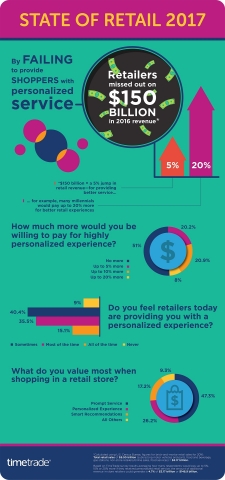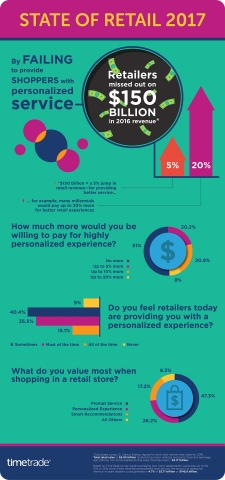BOSTON--(BUSINESS WIRE)--Disappointing shopping experiences are costing brick-and-mortar retailers serious money, according to the latest TimeTrade State of Retail 2017 survey of U.S. consumers.
In fact, the State of Retail 2017 survey results suggest that U.S. retail stores left about $150 billion in potential revenue on the table in 2016 by failing to offer shoppers the personalized shopping experiences they want. Respondents said that, on average, they would increase their in-store spending by 4.7 percent—if they received better, more personalized service from retailers. This additional revenue would represent a huge improvement for brick-and-mortar retailers, who are struggling to meet revenue, profit and stock valuation goals.
How much more would you be willing to pay for highly personalized experience?
| Up to 5 percent more | 20.2 | % | |||
| Up to 10 percent more | 20.9 | % | |||
| Up to 20 percent more | 8 | % | |||
| No more | 51 | % | |||
| Total | 100 | % | |||
Previous TimeTrade surveys of retail executives consistently show they believe their stores do provide customers with personalized shopping experiences. But consumers see things differently. About half of this year’s survey respondents (49 percent) said they “never” or only “sometimes” receive what they consider to be personalized service. In fact, 70 percent of the time they shop they said they “never” or only “sometimes” can find a sales associate when they need assistance.
Do you feel retailers today are providing you with a personalized shopping experience?
| All of the time | 15.1% | |||
| Most of the time | 35.5% | |||
| Sometimes | 40.4% | |||
| Never | 9% | |||
| Total | 100% | |||
This disparity is financially damaging for retailers. For example, 71 percent of consumers surveyed said they sometimes or always abandon dressing rooms and leave stores if they can’t obtain help with sizes, color, etc. On the other hand, 88 percent said that when helped by knowledgeable associates they are “somewhat likely” or “extremely likely” to make the purchase.
Brick-and-Mortar is Alive and Well
Despite the
continued growth of online shopping, 82 percent of respondents said they
still do half or more of their shopping in physical stores (excluding
grocery stores). Moreover, 70 percent said they planned to do the same
in 2017, with 14 percent saying they would increase the amount of
shopping they do in-store. Even when an item is available online—as well
as in a nearby store—75 percent of respondents said they preferred to
buy from the physical store.
When asked what they value most when shopping in a retail store, respondents cited prompt service, personalized experiences and smart recommendations the most. To improve service, 64 percent said they would like to schedule in store appointment (from any device) with a retail associate at a time most convenient to them.
What do you value most when shopping in a retail store?
| Prompt Service | 47.3 | % | |||
| Personalized Experience | 26.2 | % | |||
| Smart Recommendations | 17.2 | % | |||
| All Others | 9.3 | % | |||
| Total | 100.0 | % | |||
“Just imagine the positive financial impact on brick-and-mortar retailers if revenue jumped by 5 percent,” said Gary Ambrosino, CEO of TimeTrade. “Right now, retailers’ revenue projections and stock prices are under pressure as the landscape continues to change. A renewed focus on providing shoppers with a better, more personal in-store experience would go a long way toward stemming the tide of defection to competitors and online sellers.
“In store shopping is far from dead—but it does have to change to keep up with the trends. These survey results show that people definitely like shopping in stores so they can touch and feel products, and because they enjoy receiving prompt, personalized service. The key to success for brick-and-mortar retailers is to fully utilize their existing staff and relentlessly focus on providing personalized service to every customer. We know consumers are willing to pay for better service. It’s a big opportunity for traditional retailers to up their game across the board and capture that additional revenue, instead of letting those dollars go elsewhere,” Ambrosino said.
The Millennial Opportunity
Millennial respondents
(aged 21-35) offered some counter-intuitive findings. Members of this
generation, the largest in U.S. history, are entering their earning and
spending prime, making them especially important to retailers. While
many assume that millennials—who came of age in the digital world—shop
mostly online, survey results show that they prefer shopping in stores
(89 percent said they will shop as much or more in stores in 2017) and
scored higher than other age groups in the following areas:
- Almost half of them (47 percent) do 75 percent of their shopping in stores vs. online.
- 29 percent always start shopping online and go in-store to complete the purchase.
- When helped by a knowledgeable associate, 58 percent are extremely likely to make purchases.
- Nearly 70 percent said they would pay more for products or services if they had a highly personalized in-store experience. In fact, 24 percent of these respondents would pay up to 20 percent more.
Millennials said they would enjoy improved shopping experiences if provided personal assistants/shoppers (45 percent), beacon technologies (31 percent), and organized systems with wait-time displays and text/email updates when their turn is near (29 percent).
Varying Omnichannel Experiences
Respondents noted
differences when it came to providing a consistent experience across
channels. While 75 percent agreed that stores provide good service, only
38 percent felt that way about the web, 31 percent for email, 26 percent
for call centers, 24 percent for social media, 21 percent for text, and
14 percent for kiosks.
About The State of Retail 2017
The State of Retail
2017 survey of more than 2,000 consumers was conducted by national
survey firm SSI between November 6 and 12, 2016. The full report is available
for download at no cost.
About TimeTrade
TimeTrade creates conversations that
drive business. The company equips businesses to provide personalized
service to every customer, every time, creating a service guarantee that
improves customer satisfaction, loyalty and retention, and increases
sales growth. TimeTrade’s leading-edge Customer Engagement Cloud, an
enterprise platform delivered through a worldwide cloud-hosting network,
provides omnichannel and mobile application tools for managing the most
critical part of the customer journey: the live conversation. It
includes several tightly integrated modules for online appointment
scheduling, queue
management, and data-rich analytics
and reports. The company’s patented cloud technology is SOC 2 level
3 compliant and scales to meet the demands of the largest multinational
enterprises as well as mid-size and small businesses. More than 500 of
the world’s most successful brands—including the largest banks,
retailers, sales organizations and healthcare systems—rely on TimeTrade
to power their live customer conversations and improve the customer
experience, in person, by phone or online.
TimeTrade is a registered trademark of TimeTrade Systems, Inc. All other company or product names may be trademarks of their respective owners.




